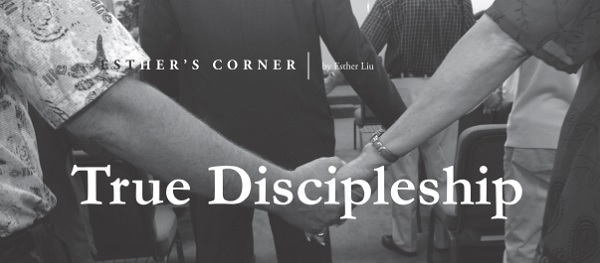True Discipleship
By Esther Liu

Best examples of what it is and what it is not both found in the Bible:
“See, this is getting us nowhere. Look how the whole world has gone after him!” What the Pharisees said to one another about Jesus from John 12:19 NIV.
“Look, the Lamb of God, who takes away the sin of the world! This is the one I meant when I said, ‘A Man who comes after me has surpassed me because he was before me.’” What John the Baptist said about Jesus from John 1:29-30 NIV.
Discipleship is not a new concept invented or started by Jesus. Moses had them (John 9:28). John the Baptist had them (John 1:35). The Pharisees had them (Mark 2:18). It is certainly not limited to just Christianity or Judaism. Siddhartha Gautama, later known as the Buddha, had many. Islam, the second largest and fastest growing world religion (only behind Christianity), started with Mohammad and a few of his disciples.
Discipleship is a phenomenon not just from the past but continues to appear today in modern-day methods such as relational discipleship (through the cell-group movement) and “experiential” discipleship (found in post-modern or emerging churches).
I would venture to say that all the discipleship programs or models fall into one of two models – John the Baptist or the Pharisees. The John the Baptist model of discipleship is about a vessel bringing people to Jesus or a sign pointing to the Way, the Truth and the Life. The Pharisee model is about just one man or woman building his or her own kingdom through followers.
Of course the most positive model of discipleship begins with John the Baptist. The ordinary Jews said: “Rabbi, that man who was with you on the other side of the Jordan—the one you testified about—look, he is baptizing, and everyone is going to him” (John 3:26 NIV). To that proclamation, John the Baptist replied: “He must increase, but I must decrease” (John 3:30 NASB).
Paul is another positive biblical example. He said: “Follow [imitate] my example, as I follow [imitate] the example of Christ” (1 Corinthians 11:1 NIV) and he bluntly pointed out the Corinthians as worldly, mere infants in Christ since, “One says, ‘I follow Paul,’ and another, ‘I follow Apollos’ are you not mere human beings?” (1 Corinthians 3:4 NIV). Paul seems very clear who he is and what is he called to do (only servant assigned to his task, 1 Corinthians 3:5). He is not out to build a kingdom for himself.
Interestingly enough, the word “disciple” disappeared altogether after Acts. 21: 16. Paul’s relationships with Timothy, Titus, Onesimus, and many others were never described as “discipler and disciples.” On the other hand, after the destruction of the temple in Jerusalem in 70 AD, Rabbinic Judaism took over the priestly tradition and made much of the concept of discipleship. All the disciples were called “Christians” (as we read in Acts 11:26), the followers of Christ. By the time 1 Peter was written (1 Peter 4:16), Christians were commonly known by all as so.

Many Christians today separate “Christian” from “disciple.” Christians have to go through some kind of “discipleship program” to become a Disciple of Christ. “Disciples” can even become an “elite” group of Christians. One feels “elevated” if one is in a “discipleship” relationship with a “discipler.” Or the “discipler” feels just a bit higher or spiritually mature than “regular Christians.” Some form groups, saying, I belong to such and such group led by so and so. Some create identities that distinguish themselves from other Christians. The concept of “we” vs. “them” eventually creeps in. And we are back at John the Baptist vs. the Pharisees.
Let’s listen to Jesus, my fellow followers of Christ:
Then Jesus spoke to the crowds and to His disciples, saying: “The scribes and the Pharisees have seated themselves in the chair of Moses; therefore all that they tell you, do and observe, but do not do according to their deeds; for they say things and do not do them. They tie up heavy burdens and lay them on men’s shoulders, but they themselves are unwilling to move them with so much as a finger. But they do all their deeds to be noticed by men; for they broaden their phylacteries and lengthen the tassels of their garments. They love the place of honor at banquets and the chief seats in the synagogues, and respectful greetings in the market places, and being called Rabbi by men. But do not be called Rabbi; for One is your Teacher, and you are all brothers. Do not call anyone on earth your father; for One is your Father, He who is in heaven. Do not be called leaders; for One is your Leader, that is, Christ. But the greatest among you shall be your servant. Whoever exalts himself shall be humbled; and whoever humbles himself shall be exalted (Matthew 23:1-12 NASB).
May the day we receive the salvation of Christ be the day we determine to become followers of Christ. May the Holy Spirit continue to shape and mold us daily into the vessels of God’s desire. May we acquire the heart and mind of Christ (Philippians 2:3-11). May God deliver us from evil, for His is the Kingdom, and the power and the glory, forever!
May the Lord Jesus increase and I decrease!


 Esther Liu, M.S., M. Div., D. M., has been a pastor and minister of Christian Formation for the past 15+ years. Her calling in life is to “make people uncomfortable.” She has been married for 22 years with two wonderful children. When she is not out challenging people to grow and to be more like Christ, she enjoys reading good books, taking long walk with her husband, and water rafting down in some class V rapid in CA rivers.
Esther Liu, M.S., M. Div., D. M., has been a pastor and minister of Christian Formation for the past 15+ years. Her calling in life is to “make people uncomfortable.” She has been married for 22 years with two wonderful children. When she is not out challenging people to grow and to be more like Christ, she enjoys reading good books, taking long walk with her husband, and water rafting down in some class V rapid in CA rivers.